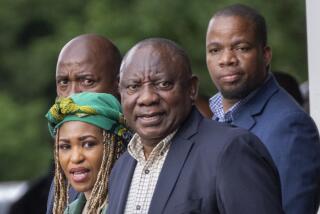S. African President, 73, Suffers Stroke
- Share via
JOHANNESBURG, South Africa — President Pieter W. Botha, 73-year-old head of South Africa’s white minority-led government, suffered a mild stroke Wednesday at his home in Cape Town and was hospitalized in stable condition, his office announced.
Botha, who has led South Africa through a tumultuous decade, was described as conscious and “quite clear-minded” by an aide, Liana Kitshoff. She added that the president would probably appoint a Cabinet minister as acting president until he fully recovers.
The president’s illness, although apparently not life-threatening, could touch off a battle for succession within the ruling white National Party and eventually affect the step-by-step reform program begun under Botha’s stern hand.
Botha currently faces some of the most challenging months of his tenure, with the beginning of independence elections in Namibia, the territory South Africa has ruled for all of Botha’s lifetime, and the likelihood of a grueling general election battle with right-wing whites at home for control of Parliament.
South Africa also faces the possibility of new sanctions from the Democrat-controlled U.S. Congress, a decision on whether to release the 70-year-old jailed nationalist leader Nelson R. Mandela and growing economic problems.
Botha’s health had been considered excellent before Wednesday, and the president had neither indicated a desire to step down nor begun to groom a successor.
Among those mentioned recently as possible successors to Botha are Education Minister Frederick W. De Klerk, leader of the National Party in the Transvaal, and Foreign Minister Roelof F. (Pik) Botha. De Klerk is considered one of the Cabinet’s more conservative members while Pik Botha, who is not related to the president, is considered among its most liberal.
Botha celebrated his 73rd birthday last week at his family’s vacation home on the southern coast and returned to prepare for the opening of the 1989 Parliament in Cape Town on Feb. 3.
He was stricken at his official residence before he left for work Wednesday and was admitted to a suburban military hospital. His wife of 46 years, Elize, and several of their five children were at his bedside most of the day.
Botha became prime minister in 1978 upon the resignation of John Vorster. In 1984 he became the country’s first executive state president under a new constitution that brought Indians and mixed-race South Africans, but not the country’s black majority, into the formerly whites-only Parliament in separate chambers.
Botha has presided over the first significant racial reforms undertaken since 1948, when the National Party came to power and launched the system of racial discrimination known as apartheid.
Under Botha, the government has abolished the notorious pass laws and legalized interracial marriages. For those efforts, he has seen the growth of the right-wing Conservative Party, which has vowed to challenge his hold on power in the next general election, which the president is required to call by next year.
But Botha has declared his opposition to a one-person, one-vote system for South Africa and refused to negotiate with the African National Congress, the primary guerrilla group fighting Pretoria.
More to Read
Sign up for Essential California
The most important California stories and recommendations in your inbox every morning.
You may occasionally receive promotional content from the Los Angeles Times.














